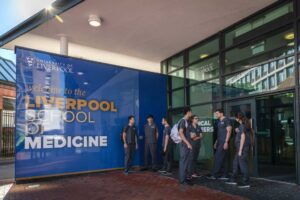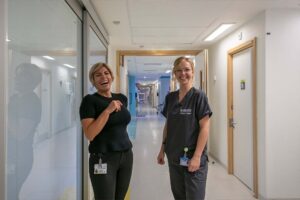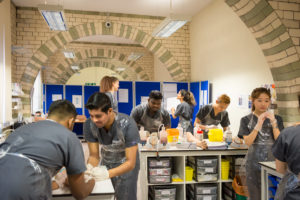Acute, Critical and Emergency Care (ACE Care)
- Study mode
- Full-time
- Duration
- 1 year
- Start date and application deadlines
-
- Start date
- September 2026
- Apply by:
- Starts on:
We've set the country or region your qualifications are from as United Kingdom.
The ACE Care programme is a one-year intercalated BSc honours degree aimed at intercalating medical students and will provide students with the opportunity to develop in depth applied knowledge, clinical practice, research skills and professional behaviours in the highly connected fields of Acute Medicine, Critical Care (including ITU Medicine), Emergency Medicine and Trauma Care.
This course will deliver a clinical research learning and placement-based experience that encapsulates the key areas of each speciality, whilst ensuring deep understanding of the inherent linked nature of the specialties with authentic assessment.
The programme will be delivered through a blended process incorporating, lectures, online learning, clinical research and placement-based learning opportunities with authentic assessments, papers, posters and oral presentations. In addition, you will develop the qualities and transferable skills necessary to make decisions in complex and unpredictable contexts; and learn how to communicate information, ideas, problems and solutions in support of patent-based medicine in the ACE environment.
In the core modules students will learn about clinical research, the interconnected ACE specialties which will also included some cross over into aspects of urgent and critical: trauma, anaesthesia, surgery, neurology, paediatrics and clinical imaging. Students will also undergo a clinical placement in one of the specialist ACE or ACE related areas within an NHS Acute Trust, working within clinical teams to apply knowledge, perform and develop clinical skills and learn (and demonstrate) professional behaviours, high intensity clinical practice situations. Student engagement and progress will be assessed by portfolio, guided reflection, alongside separate research components, which are coordinated and associated with the clinical placement, aligning with principles of the Liverpool curriculum, including authentic assessment. The assessment strategy is intended to be progressive, building on students’ learning, developing critical thinking.
This is an innovative programme in that it offers you the opportunity to experience aspects of Emergency Care medicine and the opportunity to take your first steps into clinical research in these areas.
Please note: This programme is a hospital based experiential programme and the supervisors are NHS clinicians working in the Acute, Critical Care, Trauma and Emergency Medicine areas, in exceptional circumstances (e.g. global pandemics), a student who is offered a place on the Acute, Critical and Emergency Care BSc will be offered a place on the MRes Clinical Sciences programme if we are not able to run ACE Care.
This course is for intercalating medical students who wish to develop their knowledge and understanding of Acute Medicine, Critical Care (including ITU Medicine), Emergency Medicine and Trauma Care.
Please contact us by emailing ACE.Medicine@liverpool.ac.uk to discuss your application before applying.
Discover what you'll learn, what you'll study, and how you'll be taught and assessed.
Teaching block one runs from September to winter break in December and includes the following modules:
Programme details and modules listed are illustrative only and subject to change.
Teaching block one runs from January to June and includes the following modules:
Programme details and modules listed are illustrative only and subject to change.
Teaching is delivered through a blended process incorporating, lectures, online learning, clinical research and placement-based learning opportunities with authentic assessments, papers, posters and oral presentations.
Your engagement and progress will be assessed by portfolio, guided reflection, alongside separate research opportunities which are designed the clinical placement, aligning with principles of the Liverpool curriculum, including authentic assessment.
The assessment strategy is intended to be progressive, building on students’ learning.
We have a distinctive approach to education, the Liverpool Curriculum Framework, which focuses on research-connected teaching, active learning, and authentic assessment to ensure our students graduate as digitally fluent and confident global citizens.
The Liverpool Curriculum framework sets out our distinctive approach to education. Our teaching staff support our students to develop academic knowledge, skills, and understanding alongside our graduate attributes:
Our curriculum is characterised by the three Liverpool Hallmarks:
All this is underpinned by our core value of inclusivity and commitment to providing a curriculum that is accessible to all students.
Studying with us means you can tailor your degree to suit you. Here's what is available on this course.
Intercalation allows you take a break from your medical degree, usually after year 3 or 4, and study an additional qualification. Most intercalating students choose to study a master's degree. This gives you the opportunity to explore a subject of interest at an advanced level and acquire new skills and knowledge that will enhance and/or complement your medical degree.
The School of Medicine is one of the largest providers of medical education in the country. Students have access to facilities such as the unrivalled Human Anatomy Resource Centre and Clinical Skills Resource Centre, as well as our Virtual Learning Environment. We also offer access to a comprehensive placement network with nationally recognised centres of excellence.






From arrival to alumni, we’re with you all the way:
I found it particularly interesting learning about the different team roles required in trauma cases. I have just come back from presenting my projects at the congress, which was held in Lisbon this year.
As I considered this opportunity, I realised just how important it is for junior doctors to be proficient in clinical research, no matter the specialty. I’m so glad I intercalated.

Want to find out more about student life?
Chat with our student ambassadors and ask any questions you have.
This course is designed to enhance the career of all medical students, but it will be especially advantageous for any of the emergency specialties. More specifically the programme is designed to enhance the application of medical students for both foundation (PGY 1-2) and core training (PGY 3-5). The programme incorporates key experiences and skills that will enhance your future career applications. Specific design features of the course allow exciting research experience and opportunities and the possibilities of publications and conference presentations.
99% of medical students find their main activity after graduation meaningful.
(Graduate Outcomes, 2018-19.)
My qualifications are from United Kingdom.
Your tuition fees, funding your studies, and other costs to consider.
Full-time place, per year - £9,790
Full-time place, per year - £50,000
Year abroad fee - £25,000 (applies to year in China)
The UK and international full-time fees shown are for the academic year 2026/27 (UK fees are subject to Parliamentary approval). UK year abroad and year in industry fees and international year in industry fees shown are for entry 2025, as 2026/27 fees have yet to be confirmed. Please be advised that tuition fees may increase each year for both UK and international students. For UK students, this will be subject to the government’s regulated fee limits.
Tuition fees cover the cost of your teaching and assessment, operating facilities such as libraries, IT equipment, and access to academic and personal support. Learn more about paying for your studies.
We understand that budgeting for your time at university is important, and we want to make sure you understand any course-related costs that are not covered by your tuition fee. This could include buying a laptop, books, or stationery.
Find out more about the additional study costs that may apply to this course.
We offer a range of scholarships and bursaries that could help pay your tuition and living expenses.
If you’re a UK student joining an undergraduate degree and have a household income below £35,000, you could be eligible for a Liverpool Bursary worth up to £2,000 for each year of undergraduate study.
Apply for an Asylum Seekers Scholarship and you could have your tuition fees paid in full and receive help with study costs. You’ll need to have applied for asylum in the UK, or be the dependant of an asylum seeker, and be joining an eligible undergraduate degree.
If you’ve spent 13 or more weeks in Local Authority care since age 14, you could be eligible for a bursary of £3,000 per year of study. You’ll need to be a UK student joining an eligible undergraduate degree and be aged 28 or above on 1 September in the year you start.
Are you a UK student with a Black African or Caribbean heritage and a household income of £25,000 or less? You could be eligible to apply for a Cowrie Foundation Scholarship worth up to £8,000 for each year of undergraduate study.
If you’re a UK student identified as estranged by Student Finance England (or the equivalent UK funding body), you could be eligible for a bursary of £1,000 for each year of undergraduate study.
Joining a School of Biosciences degree and have a household income of less than £25,000? If you’re a UK student, you could apply to receive £4,500 per year for three years of your undergraduate course.
Do you live in the Liverpool City Region with a household income of £25,000 or less? Did neither of your parents attend University? You could be eligible to apply for a Nolan Scholarship worth £5,000 per year for three years of undergraduate study.
Are you a UK student with a household income of £25,000 or less? If you’ve participated in an eligible outreach programme, you could be eligible to apply for a Rigby Enterprise Award worth £5,000 per year for three years of your undergraduate degree.
Are you a UK student with a household income of £25,000 or less? Did neither of your parents attend University? You could be eligible to apply for a ROLABOTIC Scholarship worth £4,500 for each year of your undergraduate degree.
Apply to receive tailored training support to enhance your sporting performance. Our athlete support package includes a range of benefits, from bespoke strength and conditioning training to physiotherapy sessions and one-to-one nutritional advice.
Joining a degree in the School of Electrical Engineering, Electronics and Computer Science? If you’re a UK student with household income below £25,000, you could be eligible to apply for £5,000 a year for three years of study. Two awards will be available per academic year.
If you’re a young adult and a registered carer in the UK, you might be eligible for a £1,000 bursary for each year of study. You’ll need to be aged 18-25 on 1 September in the year you start your undergraduate degree.
My qualifications are from United Kingdom.
The qualifications and exam results you'll need to apply for this course.
Successful completion of 3 years of a GMC recognised undergraduate basic medical education degree programme, with applicants in good academic and professional standing. Selection will be via a composite score which incorporates relative academic performance, evidence of proactive active engagement in one of the specialist clinical areas or student society, or charity, or sport (personal or coaching) and personal statement.
Your personal statement should explain why you want to do the programme and what it will mean for you. It should also cover your active engagement with any of the activities listed above. This should be incorporated in 1 page A4 maximum (not including transcript). Arial 11pt minimum.
Please submit your transcript and personal statement by email to ACE.Medicine@liverpool.ac.uk.
| Qualification | Details |
|---|---|
| GCSE |
4/C in English and 4/C in Mathematics |
| International qualifications |
If you hold a bachelor’s degree or equivalent, but don’t meet our entry requirements, you could be eligible for a Pre-Master’s course. This is offered on campus at the University of Liverpool International College, in partnership with Kaplan International Pathways. It’s a specialist preparation course for postgraduate study, and when you pass the Pre-Master’s at the required level with good attendance, you’re guaranteed entry to a University of Liverpool master’s degree. |
You'll need to demonstrate competence in the use of English language, unless you’re from a majority English speaking country.
We accept a variety of international language tests and country-specific qualifications.
| Qualification | Details |
|---|---|
| International Baccalaureate English A: Literature or Language & Literature | Grade 6 at Standard Level or grade 6 at Higher Level |
| International Baccalaureate English B | Grade 7 at Higher Level |
Have a question about this course or studying with us? Our dedicated enquiries team can help.
Last updated 4 December 2025 / / Programme terms and conditions